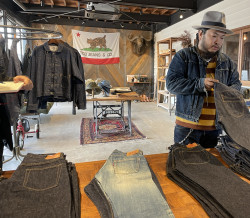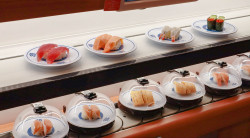
Originally published on metropolis.co.jp on September 2010
Bummer
- The Ministry of Health, Labour and Welfare announced that distribution of income in Japan is more unequal than at any other time in modern history.
- A government council estimated that, during the next decade, there is a 20 percent chance of three major earthquakes occurring simultaneously in one of the country’s major fault lines. Such a quake would result in 25,000 deaths and 550,000 destroyed buildings.
- Residents in the town of Kami in Miyagi Prefecture were distraught after a “sacred” 400-year-old cedar tree was uprooted by high winds and fell onto a shrine.
- A phys-ed teacher at a public high school in Nerima-ku left open a faucet that fed water into the school’s swimming pool for an entire month, costing the city approximately ¥5.1 million.
- Headline of the Week: “Man Upset Over Cat’s Death Drives 90km Wrong Way Along 2 Expressways” (via The Mainichi Daily News)
Clever Criminals

Illustration by Enrique Balducci
- A 31-year-old Chiba man was arrested after cops found 550 grams of stimulant drugs with a street value of approximately ¥50 million hidden inside noodle containers in his home and in an apartment in Tokyo.
- A Fukushima woman was busted for pocketing a ¥300,000 gift from the local government that was meant for her mother on the occasion of the older woman’s 100th birthday. Mom was, in fact, deceased.
- The MPD busted a 41-year-old Tokyo man and a 31-year-old Chiba man for stealing 220 motorcycles and scooters and selling them to a Ghanaian accomplice, who allegedly smuggled them to Africa.
- Sentence of the Week: “Police turned over to prosecutors Wednesday their case against a 21-year-old man who walked naked on a street in Yokohama last month and a 22-year-old woman who ordered him to do so” (via The Japan Times).
Milestones
- A 14-year-old Shanghai boy became the first foreigner living overseas to qualify for training as a shogi pro.
- Toshiba has developed a flash drive whose circuitry is just 24 nanometers wide. It’s thought to be the slimmest such device in the world.
- Officials in Sapporo announced that they would use the city’s Tozai subway line for regular postal delivery service.
- Japanese theater enthusiasts were delighted by the discovery in Shibuya of an 18th-century reference book for making noh costumes.
Japan Ink
- After receiving reports that some people were reluctant to go to a beach in Suma Ward due to an influx of youngsters with tattoos, officials in Kobe are mulling whether to ban people with tats from the beach.
- Officials in Yamanashi are considering a plan to charge a fee to climbers on Mt. Fuji. Local governments spend ¥35 million per year to maintain lodges, toilets and changing facilities on the mountain.
- Extreme temperatures are being blamed for the poor turnout at an annual imonikai (stew festival) in Yamagata. The organizers prepared 30,000 servings of the local meat-and-potato concoction, but were forced to ladle out the last 1,000 for free.
- Two workers and a customer were injured when a pair of men set fire to a hostess club in Nagoya. The men had previously punched the club’s manager in a scuffle.
Frankenmouse!
- Japanese scientists used stem cells to create a rat pancreas inside the body of a mouse. It is hoped that the knowledge gleaned from this experiment will lead to “creating human organs from other animals for use in organ transplants.”
- The president of the Science Council of Japan branded homeopathic medicine “a hoax” after a series of deaths and injuries connected with the practice.
- The Japanese government unveiled a mobile chemical weapons disposal facility in Nanjing. It is thought that the number of World War II-era chemical weapons left in China by Japan may be as high as 400,000.
- Two sisters, aged 77 and 84, were found dead of heatstroke in their apartment in Toshima Ward. A neighbor told police that the women had a dislike of air conditioners.
Cool Biz
- It was announced that Mitsubishi will provide ¥3.3 billion worth of air conditioners for trains on the London Underground—the first time since the railway’s inception in 1863 that trains will get A/C.
- It was reported that the recent record-breaking temperatures have led a hairdresser in Yamagata to develop a refrigerated menthol hair treatment dubbed “cool shampoo.”
- The strong yen isn’t all bad for Japanese businesses: Thomson Reuters reports that there have been 312 mergers and acquisitions carried out by Japanese companies overseas this year—the highest number in a decade.
- Meanwhile, a resort hotel in Hakone is offering room rates on a sliding scale that’s tied to the exchange rate of the yen.
- The Japan Automobile Dealers Association said that sales of new cars rose 47 percent in August compared to a year earlier—the biggest jump in 38 years.
Here & There
- The government revealed that the number of Japanese people working in agriculture and forestry has plummeted by 22.4 percent during the past five years.
- A study by the labor ministry found that the Japanese economy lost ¥2.7 trillion last year due to “suicides and loss of employment due to depression.”
- It was reported that JAL is mulling whether to start a budget airline as a way of escaping its financial woes.
- Fujitsu and NEC announced programs that use cloud computing to help public libraries better manage information on lending books.
Compiled from reports by Bloomberg, BBC, Japan Today, The Japan Times, International Herald Tribune/The Asahi Shimbun, The Mainichi Daily News, The Tokyo Reporter, The Daily Yomiuri, AP and Kyodo







